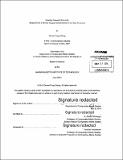| dc.description.abstract | Look around you. What unassuming skills or assets are just bursting with potential? Meet the peer economy, where people monetize skills and assets they already have using online, peer-to-peer marketplaces. Lyft, Shapeways, Etsy, Skillshare... these platforms enable strangers to transact confidently. Instead of education, reskilling or being network rich, new marketplaces emerge everyday to reconfigure people's existing assets and skills into income generating opportunities. Airbnb, TaskRabbit, KitchenSurfing, Postmates... From small-scale manufacturing to space sharing to personal services, amateurs and professionals alike can easily jump in. As an alternative to full-time employment with benefits-a 20 century model worn thin-the peer economy (sometimes called the "sharing economy") is setting imaginations on fire. At its best, the peer economy can reintegrate people who are defined out of the traditional workplace and, therefore, the traditional economy (the elderly, homemakers, those with varying physical and mental ableness, those at risk for human trafficking, etc.). At its worst, it exploits human labor and degrades human dignity. Between positive and negative speculations, I have identified five particularly sticky issues: 1. Can peer economy opportunities comprise a livable work lifestyle? 2. Who is accountable when something goes wrong? 3. Do legal classifications override social relationships? 4. Can providers cultivate a collective voice? 5. How do peer economy actors historically contextualize the model? The thesis begins with a historical overview of how we have arrived at this moment of possibility. The second act brings readers up to speed on conversation among investors, startups, cities, policy makers, entrenched interests, media, scholars and critics, and labor advocates. As antecedents to the peer economy, I introduce marginalized movements in the third chapter that could inform how the peer economy develops; I believe that this space can be a distributed network that matchmakces providers' needs with capacity across the sector. From 2013-2014, I conducted ethnographic field research to suss out emergent needs among peer economy providers, and I summarize the results in chapter four before finally tying together why the peer economy-regardless of speculation-has been so captivating. This thesis is a confluence of historical analysis, economic theory, sociology, rhetorical analysis, qualitative and ethnographic fieldwork, and legal precedents that culminates in interventions for the peer economy. First and foremost, it considers whether the peer economy is a livable work lifestyle. The peer economy is a charismatic and rapidly spreading concept that is fundamentally transforming the way many people think about employment. | en_US |
